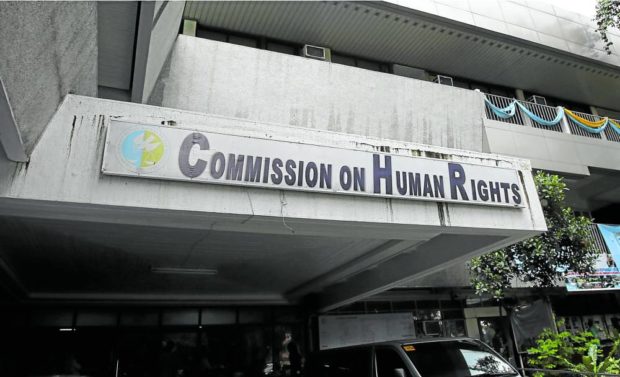
The Commission on Human Rights office in Quezon City. (INQUIRER FILE PHOTO)
MANILA, Philippines — The Commission on Human Rights (CHR) has called on Facebook and several online store applications to take down promotional photos of t-shirts posted by a clothing line where women are sexually objectified and are placed on “hypersexualized positions.”
In a statement from CHR’s Gender Equality and Women’s Human Rights Center on Friday, the Commission had been notified by the Women’s Legal and Human Rights Bureau, a feminist non-government organization, over the Facebook posts and products of KNPP, a clothing line that specializes in pop culture and hiphop fashion.
The t-shirts being sold online, CHR said, depict women in lewd positions along with a message that supposedly normalizes sexual objectification.
“Despite provisions of the Magna Carta of Women on non-derogatory portrayal of women and the provisions of the Safe Spaces Act penalizing sexism and misogyny, businesses like KNPP are still able to openly operate and earn from the sexual objectification of women. It is thus with urgency that CHR calls on Facebook, Lazada, and Shopee to immediately take down posts and accounts of KNPP,” CHR said.
“We call on businesses and social media platforms to be our partners in protecting women’s human rights and not allow their platforms to be sites of violence and sexual harassment,” CHR added.
The Commission also asked the Philippine National Police (PNP) and the Department of Trade and Industry (DTI) to check on the clothing line’s owners and the page account operators for possible violations regarding their sale of such products.
“We also call on the Cybercrime Investigation and Coordinating Center to trace and identify the account holders, and for the Department of Trade and Industry to investigate the registration of these businesses and the possible violations they may have committed,” CHR noted.
KNPP is a stylized name of the clothing line’s past name — “Kain Pepe,” which is sexual in nature and described as offensive to moralists.
In 2020, KNPP also met controversy after women’s rights advocate and party-list group Gabriela called on the group to correct the “damaging” objectification of women. But in a ScoutMag article released during the same year, KNPP’s owners said there is nothing wrong with the brand, saying that it is not about objectification of women.
READ: Gabriela slams ‘obscene’ clothing line | Local clothing line struggles to explain their misogynistic designs
In the article, KNPP explains that ‘Kain Pepe’ is Filipino for ‘eat well, kids’ — as ‘Pepe’ is a nickname often used for young male children. However, most of the designs of the said clothing line depicts the act of cunnilingus or women’s genitalia, with scantily-clad women wearing the outfit.
CHR said that aside from this, most of the engagement of KNPP comes from men, and that many reports have been made by netizens for the alleged obscenity.
INQUIRER.net has sought the side of KNPP but anyone from the clothing company has yet to reply as of posting time.
“The posts and engagements on Facebook and other shopping outlets also reveal that the target market of the shirts are men and that many reports for obscenity were already made against the Facebook page to no avail,” CHR said.
“The open posting, display, and sale of these shirts and other products of KNPP are blatant disregard of laws protecting women from discrimination, violence, and all forms of sexual harassment,” it added.
Filipinos must not allow sexist and misogynistic actions to persist as women should be entitled to safe spaces, the Commission said.
“We call on the public to continue to be vigilant and be the Commission’s partners in calling out and holding into account sexist, misogynistic remarks, and acts. Let work together to make all spaces safe and empowering,” CHR explained.